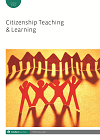- Home
- A-Z Publications
- Citizenship Teaching & Learning
- Previous Issues
- Volume 6, Issue 3, 2011
Citizenship Teaching & Learning - Volume 6, Issue 3, 2011
Volume 6, Issue 3, 2011
-
-
Teaching history and educating for citizenship: A new approach in Quebec
More LessBy Ken OsborneThis article examines the ways in which history has been combined with citizenship education in Quebec's new high school curricula in world and Quebec/Canadian history to create a new subject, history and education for citizenship, in which every unit of study is assigned a distinct 'citizenship objective'. The article examines the conception of citizenship on which Quebec's new curriculum is based, its educational goals, the specification of objectives, the approach taken to history and overall programme design.
-
-
-
Competing citizenship identities in the global age: The case of Hong Kong
More LessAuthors: Yan-Wing Leung and George Siu-Keung NgaiThis article explores the struggles between differing of multiple citizenship identities of Hong Kong people. Firstly, it discusses the tension caused by contesting portraits of local identity of being 'Hongkongese' by comparing the version portrayed by the Hong Kong Special Administrative Region (HKSAR) government and the version reflected in the political experiences of Hong Kong people. Then it explores the tensions caused by competing versions of national identity as reflected in the debates in civic education, followed by the exploration of the tension between the local identity of being Hongkongese and the national identity of being Chinese in the context of grand projects on national education by the government. Then, the article investigates conflicting global and national identities, and the inadequacy of global identity portrayed by the HKSAR government. Finally, it argues that a comprehensive global identity could make a greater contribution to China, as both Hong Kong and China are marching forward together sharing a common fate, in facing a rapidly globalizing era. Hopefully, this article will serve as an example of how conflicting multiple identities could be addressed in the global era.
-
-
-
'Political ideas can only be discussed if they are in the syllabus; otherwise a political discussion is not necessary': Teachers' views on citizenship education in Zimbabwe
More LessThis study on the introduction of citizenship education in Zimbabwe reviewed teachers' opinions about and preparedness in implementing the programme. Data were collected through in-depth face-to-face interviews with 21 teachers purposefully selected from two high schools in the country. Interviews focused on teachers' conceptions of citizenship and citizenship education, the status of citizenship education in the curriculum, teaching techniques regarded as appropriate for teaching citizenship issues, assessment and training needs. In the sample there were a wide range of views on the meaning and purpose of citizenship and citizenship education. While some teachers are positive about the purpose of this subject, others think that it is an attempt to indoctrinate and silence young people from being critical of the government.
-
-
-
Teachers' conceptions of citizenship in New Zealand social studies education
More LessAuthors: Andrea Milligan, Mike Taylor and Bronwyn E. WoodAlthough 'citizenship' has long been a feature of New Zealand social studies curricula, there has been little New Zealand research about the meanings teachers attach to the concept. On the basis of a number of focus group interviews, we examine conceptions of citizenship held by primary and secondary social studies teachers. The discussions reveal that many teachers framed citizenship as 'belonging' – a heuristic that was sufficiently malleable and open to embrace pluralism, and different scales of citizenry, while attempting to maintain a sense of cohesiveness. While 'citizenship as belonging' may hold appeal, the absence of critical debate about contested aspects of citizenship within the teachers' discussions is problematic. We argue that the New Zealand social studies teaching community vitally and urgently requires exposure to debates about 'citizenship' and citizenship education.
-
-
-
Turkish students' perceptions of citizenship duties and rights: An evaluation of citizenship education in Turkey
More LessAuthors: Kemal Duruhan and Süleyman Nihat ŞadThe purpose of this study is to make a comparative analysis of the Turkish students' perceptions of their duties and rights regarding citizenship and human rights. For that reason, 120 students, randomly selected from the eighth class (aged 13–14) of four primary schools in Malatya, a city in eastern Turkey, were given the 'Perceived Citizenship Rights and Duties Scale' developed by the researchers. As a result, it was found that students have perceptions about citizenship duties and rights favourably high, while they prioritize the former. Moreover, perceived citizenship rights scores of girls and students at a central school were found to be significantly higher. No significant difference was observed in terms of the father's educational background and following the news in media. The mother's educational background was found as a significant variable in terms of citizenship rights and duties. Academic achievement in the citizenship and human rights lesson was also found as a significant variable in terms of perception of citizenship rights.
-
-
-
Report on an experience of in-service teacher training on human rights and citizenship education
More LessThis article presents a training experience on human rights and citizenship education that took place at three in-service teacher training courses. This experience occurred in the more general context of an ongoing 'Human Rights and Citizenship Education' project, overseen by our institution, the College of Education – Polytechnic Institute of Coimbra, University of Granada and the Council of Europe (particularly, the European Youth Centre Budapest). In-service teacher training is an important component of this project, which seeks excellence and high quality in both teaching and training. The use of non-formal education methodologies is a distinctive feature of this experience and of the project.
-
Most Read This Month


